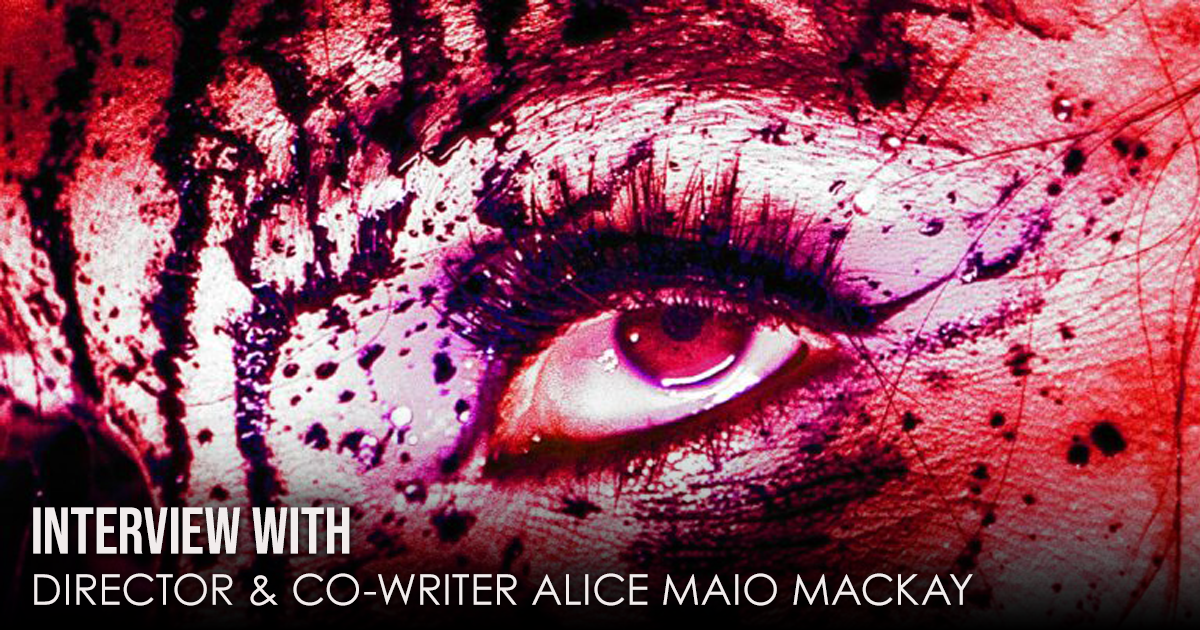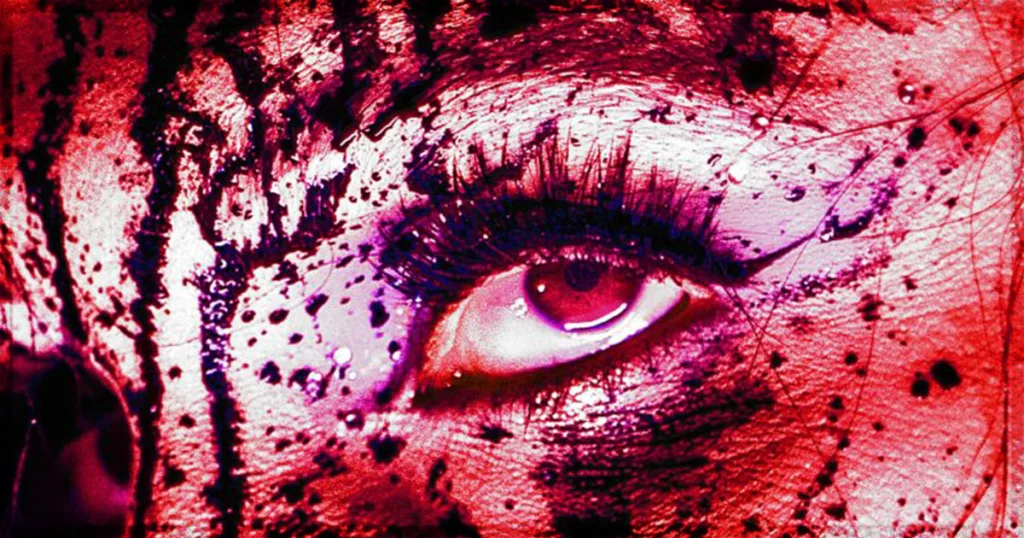Director Alice Maio Mackay sits down to chat over zoom with Alise Chaffins about the comedy-horror film Satranic Panic.
The Interview with Satranic Panic’s Alice Maio Mackay
[Editor’s Note: This interview has been lightly edited for clarity.]
Alise Chaffins: I was super excited to watch this, mostly just because of the title. I thought it was just such a clever name. Can you just talk a little bit just about the title?
Alice Maio Mackay: Of course. We actually wrote the script and didn’t have a title for it. It was actually like the title of the end song for a while, but then Cassie (Hamilton) came up with it one day, and it was kind of just perfect.
Alise Chaffins: So this is mostly a road trip movie, but I kind of love that you reference small towns throughout just because that tends to be kind of where people think bigotry happens, but also that there are just queer people around all the time. So, can you talk a little bit about your choice of the setting for this?
Alice Maio Mackay: So especially with the bigotry as well, I’ll say like that, given Jay and Aria live in a bigger city, and that’s where their friend actually dies. I don’t know. It kind of just shows that bigotry isn’t just like in the smaller towns. It’s kind of like just throughout society in general. But yeah, I always knew that I wanted to do a road trip film, kind of like, I don’t know, in my head, it’s like, Priscilla Queen of the Desert meets Buffy kind of that kind of vibe. And I just knew that it was going to be super clear. And obviously, having the two lead characters go to these different towns is fun and all, seeing their found family and stuff like that. But I wanted to, I don’t know, meet other queer characters as well, and obviously, like, there’s a love interest later on as well.
Alise Chaffins: You kind of mentioned this; the themes of found family and living authentically as yourself are super clear. I’m kind of curious: did you have those themes in mind first and then build a story around them, or did you have this satanic cult idea and then those themes emerged from that?
Alice Maio Mackay: I think the very first idea for this film was just the concept of a trans drag performer traveling with their comic book artist friend and killing demons. Like, that was the very first sentence. I’ve always loved having my work be ultra campy and fun and, you know, sometimes like shocking, but at the end of the day, I wanted this film to be grounded emotionally and, I don’t know, showcasing how the characters deal with grief and how they need their own family and things like that.
Alise Chaffins: So your work has been primarily in the horror genre. Can you talk about why you see that as a good medium for telling queer stories?
Alice Maio Mackay: Yeah. I mean, firstly, I’ve loved horror ever since I was young. Like, I grew up on monsters and Scooby Doo and Addams Family and things like that. So I’ve been a long-time fan. But in terms of filmmaking, I find the genre is really great because you not only get to tell a queer story, but it can also have genre elements. And it’s just like the combination of those two is just really fun to play with. Like, if I just made a film, I don’t know about trans grief and found family, I don’t know. I feel like that’s not really what I want to do at the moment. Like that would be kind of just somber, whereas, throwing in the horror element, we get to see these trans characters literally battle demons and get the win and overcome these monsters in a literal sense, as well as metaphorically. And I guess also when it comes to audiences, you know, hopefully, like trans people find it. But also then cis people who just love horror films, and hopefully they see the film, and they may not have seen a trans film, and they get something out of it as well. So there’s all the different elements that I really love about it.
Alise Chaffins: Yeah, I love that your movies are so focused on queer characters and trans characters specifically. I just think that’s really interesting and exciting to see out of a filmmaker. Can you just talk about your decision to do that? Because I’m sure that there are people who would say that maybe that is not the pathway to success or whatever.
Alice Maio Mackay: Yeah, I mean, I don’t know. I feel like despite the project or, I guess, genre I end up working in, there’s not really something I want to do that doesn’t have at least trans people involved on the screen in some element, even if they’re not playing, you know, sad trans roles. I think it’s just important to me as a trans person. I do other jobs in the industry as well. And it’s quite a still straight-dominated industry. So for me, you know, I started filmmaking because I love film and I love storytelling, and I want to make things that I would like to see. So from the very first feature and shorts I’ve made, it’s always been centered around queer or trans people in some regard. And I think representation is important. And it’s always just really special to me as well.
Alise Chaffins: The one thing that I noticed sometimes is that just to counter right-wing talking points about queer people, there can be this push to make them, I don’t know, too gentle or almost like otherworldly in this really positive light, and you, especially in this film, don’t shy away from making them villains to some degree. Can you just talk about that choice, that decision to go that way?
Alice Maio Mackay: I feel like watering queer and transness down and characters down is not really interesting to me. Also just not realistic. We have drag queen demons in this film, and we have trans heroes. They’re just creepy, cool people. And I just want to showcase that world entirely. It doesn’t really like come across my mind I should make this trans person palatable for a cis person. Like, the film is called Satranic Panic. I feel at this point, if you’re going to watch the film, you may as well get it unfiltered. And same with T Blockers, my previous film, it’s like, trans people, they drink, they smoke, they do drugs, they have breakdowns, you know, they’re sometimes bit catty. Straight people get to have multitudes to their characters. So I think it’s only fair.
Alise Chaffins: Yeah, absolutely. I think it does just create this more realistic world, in a world with, you know, a satanic cult that’s bringing up demons. Anyway, I loved the whole Dr. Fenway storyline. I just thought that that was really interesting. Can you talk some just about the way that you developed that character? Because I just think he’s a really interesting villain.
Alice Maio Mackay: Yeah. I mean, I don’t want to say too much about it, but I don’t know. I think I was just angered by a doctor at the time. And I thought it would be really interesting to explore, I don’t know, like, this evil endo doctor. And then the whole thing about her being able to sense hormones and that kind of backfiring. Yeah, it was just like a really interesting angle. And I really loved shooting his backstory parts as well, this melodramatic, vignette kind of style. He was just a really interesting and kind of perfect villain for the film, I thought.
Alise Chaffins: Even though this does really kind of deal with grief, and it ends on kind of a, I don’t want to say somber exactly, but a more serious note, there’s a lot of like humor in this. Can you talk about choosing to make it this horror comedy?
Alice Maio Mackay: I guess the end, it’s pretty somber, actually, but yeah, I think it just like setting the world in and focusing on a drag performer – that was already gonna have kind of confident, performance-based lead, and that leads to humor as well, naturally. This film is definitely more comedic than my other films, and that’s in part bringing on Cassie, who plays Ara as the third co-writer as well. Her background is in theater. So having her as well as Ben and myself, was just an excellent way to kind of bring in different tones and stuff to the script. But I think the comedy element is also a good way to offset the really dark tones. Because at the end of the day, their partner and friend is murdered, and a lot of other sad things as well. So yeah, it’s just like countering those things.
Alise Chaffins: Well, congratulations on this. It’s super fun. I hope that people are able to find it and purchase it and watch it. It’s a really great, fun film. So thank you so much.
You might also like…
‘Satranic Panic’ Review: Alice Maio Mackay’s Latest Film


